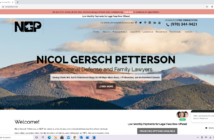Solosez, purchased awards, testimonials, listserv lunches, and providing good service are what underpin Jamison Koehler’s practice.
Becoming a solo practitioner was not what Jamison Koehler had in mind when he left his job as a public defender in Philadelphia in 2009 and moved to Washington D.C. to join his wife, who had a successful white-collar criminal-defense practice in town. “I had hoped to hook up as an associate with a law firm doing criminal defense,” he says. “I wanted to have the sort of apprenticeship that I got at the defender’s office, where you have all sorts of training and support. But I didn’t have any luck at that, so I had no choice but to strike out on my own.”
Adding to the challenge, Koehler just missed the deadline to get on the court-appointed panel. For his first year on his own — as a newcomer in a city overrun with lawyers — he would have to get by on retained work. “It was scary,” Koehler recalls. But he did well enough that he was able to raise his rates after just six months. As he remarked on his blog at the time, paraphrasing another law blogger, “The more money people pay me, the more they seem to like my work.”
Eight years later, Koehler is comfortably established in a solo criminal-defense practice in the nation’s capital, no small feat in that highly competitive market. He has chronicled his triumphs and tribulations in a blog which won a spot on the ABA’s top 100 law blogs list four years in a row.
Online Mentoring
Koehler gives major credit to the ABA’s SoloSez listserv for help in getting his solo practice launched. In that online forum, he found the mentoring he had hoped to get in a law firm. “You can get an answer on almost anything you need to know within a matter of minutes,” he marveled in a blog post during his first year on his own. “In fact, I haven’t made a single decision on the launching of my firm that I haven’t cleared through the Solosez group first.”
He got answers, sometimes “literally within minutes,” on issues ranging from setting up a sole proprietorship to the pros and cons of having an unconventional business card. When he floated ideas for a firm motto on Solosez, his initial top choice, a Latin phrase, was derided as too pretentious, so he dropped it. The “lukewarm” response he got for “Your Rights, Your Lawyer,” was good enough. It’s the motto emblazoned on his website’s home page to this day.
It’s a “pretty smart and impressive group of people” participating in an “amazingly civil” forum, according to Koehler, who says all new attorneys should tap the collective wisdom on listservs. He has followed two others in addition to SoloSez: one for a local trial lawyers group and another run by the National Association of Criminal Defense Lawyers. “You have to be careful what you read online because who knows who these people are, but it is a good support network and it was really helpful to me.”

Advertising Didn’t Work
A recurring topic in the forums is how to get good clients while avoiding bad ones. Koehler learned that openly offering a “free consultation” was a good way to get a lot of the latter: people who wanted advice but had no intention of retaining him. These days, though he no longer advertises the fact, he is happy to talk to prospective clients over the phone free of charge. But he keeps the chat brief. He’ll bring them into the office for a more substantive consultation only if they seem to be a good fit.
To get prospective clients to call in the first place, Koehler learned early on that in a legal market as crowded as D.C., advertising didn’t help. “Every time I have done advertising, I have always regretted it,” he says. He ran a small ad in a local weekly paper for three months. It yielded one call–from someone in a jurisdiction where he was not licensed to practice. He also experimented with a paid listing in the Avvo lawyer directory. “I just did not see the return on that. I may have gotten some clients through Avvo, but not many,” he says.
It didn’t help that his Avvo rating for a long time was less than a perfect 10, for reasons that baffled him. “A few years ago I had an 8.6 and someone else I knew with fewer years in practice had a 10. I looked at his profile and he listed a couple of those ‘top 100 trial lawyer’ awards,” of the sort that anyone could get for a price. “I had what I thought were better awards, including a top 100 ABA legal blogs award,” Koehler says. “But I shelled out the $300 to be ‘a top 100 trial lawyer’ and I put it on my Avvo profile, and boom, I was a 10. It’s crazy because it doesn’t mean anything, but I’ll play the game.”
Koehler’s blog now sports an impressive array of badges for commendations he has received—or purchased, as the case may be—including his ABA Blawg 100 awards, the dubious “Top 100 Trial Lawyers” award and another for “Top 10” in client satisfaction.

Client Testimonials
He’s happy to tout those badges for whatever they’re worth, but Koehler says the most compelling endorsements are from former clients. He has gotten plenty of them. On the page on his website that carries his professional biography, Koehler has posted more than 40 glowing testimonials from former clients heaping praise on his “superb” and “exceptional” work on their cases. Most of the testimonials were originally posted on Avvo, where he has accumulated, at last count, 34 five-star reviews and 10 attorney endorsements.
Koehler says he casually solicited some of them from happy clients. “Sometimes people who were pleased with the result of their case will say that they want to pay me more, and I will say that I charge a flat fee but if you want to do something for me, post a comment on Avvo.” But most were posted without any prompting from him. “The key thing is to just do the job. There is nothing better than that.”

Drawing Web Traffic
Koehler says he has never tried to search-engine optimize his blog or website. Much of the content he has posted online isn’t even necessarily written for prospective clients. The posts that first got traffic flowing to his blog were detailed analyses of the procedures that police are required to follow in making arrests for driving under the influence, with titles not made to go viral such as “Challenges to Field Sobriety Tests: The Horizontal Gaze Nystagmus Test in Washington, D.C.”
One day in court, he learned that some of the most avid readers were police officers. “I was cross-examining an officer about the standardized field sobriety test in a DUI case. He came up to me afterwards and he was so excited,” Koehler says. “He said, we use your blog at the police department on the elements of the standardized field sobriety test. I was flattered by that.”
Though they are written for legal professionals, the posts serve a marketing purpose. “If a potential client is interested in you, they will look you up on the internet and read your blog, and you want them to think, this person knows what they’re doing,” Koehler explains. A website with substantive content is particularly important for criminal defense attorneys, he adds. “People who are arrested are often embarrassed by it. If you get a DUI or solicitation of prostitution, you’re not going to say to your friends, ‘Hey, I just got arrested for DUI, do you know a good lawyer?’ They’re more likely to go online for something like that.”
Koehler has recently scaled back on blogging. “I have gotten busier recently so I have not kept up with it as much. Plus the blogosphere has kind of run its course. People aren’t reading blogs the way they used to,” he says. When he got his start in 2009, “there was a very vibrant criminal defense blogosphere, which was another great community of people exchanging ideas. There were some disagreements and some back and forth, but that was the most interesting thing about the blog. Now people are having those exchanges on Twitter,” Koehler says. “People think Twitter has basically killed the blogosphere.” On his own Twitter and Facebook pages, law-related posts only make occasional appearances alongside family news and Koehler’s political opinions.

Don’t Neglect Networking
The various online platforms Koehler has used have been instrumental in helping him successfully get his practice up and running. But he also learned early on about the value of face-to-face connections. For that, too, he thanks SoloSez. On the forum, he learned that listserv members who lived in the Washington D.C. area met regularly for lunch, and he began to join the group. It was one of his first stabs at networking. “I’m an introvert so it doesn’t come naturally to me. I had never really done any networking.”
Over time at the SoloSez lunches, Koehler disabused himself of some of his preconceptions about the process. “It’s not about just handing out your card hoping somebody will say, ‘I know so and so who needs a lawyer like you.’ For me, it was about meeting some really neat people who were starting out like I was. We got to know each other and we became friends. Eventually I got referrals through them and I refer cases to them as well. I didn’t do that because they gave me their business card at a lunch. I had gotten to know that they were good lawyers and also good people — the type of person I would want to refer cases to.”
They are colleagues that have given him practical advice and emotional support over the years. The occasional referrals are “just an added benefit.”




